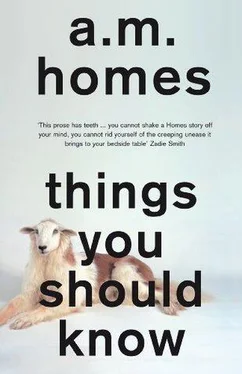I sit on the edge of the tub, looking at her. “I’m worried.”
“Don’t worry,” she says. “And don’t just sit there staring.”
Earlier in the afternoon we were fighting, I don’t remember about what. I only know — I called her a bitch.
“I was a bitch before I met you and I’ll be a bitch long after you’re gone. Surprise me,” she said. “Tell me something new.”
I wanted to say, I’m leaving. I wanted to say, I know you think I never will and that’s why you treat me like you do. But I’m going. I wanted to get in the car, drive off, and call it a day.
The fight ended with the clock. She glanced at it. “It’s six-thirty, we’re meeting Eric and Enid at seven; put on a clean shirt.”
She is lying on the bathroom floor, the print of the bath mat making an impression on her cheek. “Are you comfortable?” I ask.
She looks surprised, as though she’s just realized she’s on the floor.
“Help me,” she says, struggling to get up.
Her lips are white and thin.
“Bring me a trash can, a plastic bag, a thermometer, some Tylenol, and a glass of water.”
“Are you going to throw up?”
“I want to be prepared,” she says.
We are always prepared. We have flare guns and fire extinguishers, walkie talkies, a rubber raft, a hundred batteries in assorted shapes and sizes, a thousand bucks in dollar bills, enough toilet paper and bottled water to get us through six months. When we travel we have smoke hoods in our carry-on bags, protein bars, water purification tablets, and a king-sized bag of M&Ms. We are ready and waiting.
She slips the digital thermometer under her tongue; the numbers move up the scale — each beep is a tenth of a degree.
“A hundred and one point four,” I announce.
“I have a fever?” she says in disbelief.
“I wish things between us weren’t so bad.”
“It’s not as bad as you think,” she says. “Expect less and you won’t be disappointed.”
We try to sleep; she is hot, she is cold, she is mumbling something about having “a surgical belly,” something about “guarding and rebound.” I don’t know if she’s talking about herself or the NBA.
“This is incredible.” She sits bolt upright and folds over again, writhing. “Something is struggling inside me. It’s like one of those alien movies, like I’m going to burst open and something’s going to spew out, like I’m erupting.” She pauses, takes a breath. “And then it stops. Who would ever have thought this would happen to me — and on a Saturday night?”
“Is it your appendix?”
“That’s the one thought I have, but I’m not sure. I don’t have the classic symptoms. I don’t have anorexia or diarrhea. When I was eating that pizza, I was hungry.”
“Is it an ovary? Women have lots of ovaries.”
“Women have two ovaries,” she says. “It did occur to me that it could be Mittelschmertz.”
“Mittelschmertz?”
“The launching of the egg, the middle of the cycle.”
At five in the morning her temperature is one hundred and three. She is alternately sweating and shivering.
“Should I drive you back to the city or to the hospital out here?”
“I don’t want to be the doctor who goes to the ER with gas.”
“Fine.”
I am dressing myself, packing, thinking of what I will need in the waiting room: cell phone, notebook, pen, something to read, something to eat, my wallet, her insurance card.
We are in the car, hurrying. There is an urgency to the situation, the unmistakable sense that something bad is happening. I am driving seventy miles an hour.
She is not a doctor now. She is lost, inside herself.
“I think I’m dying,” she says.
I pull up to the emergency entrance and half-carry her in, leaving the car doors open, the engine running; I have the impulse to drop her off and walk away.
The emergency room is empty. There is a bell on the check-in desk. I ring it twice.
A woman appears. “Can I help you?”
“My wife is not well,” I say. “She is a doctor.”
The woman sits at her computer. She takes my wife’s name. She takes her insurance card and then she takes her temperature and blood pressure. “Are you in a lot of pain?”
“Yes,” my wife says.
Within minutes a doctor is there, pressing on my wife. “It’s got to come out,” he says.
“What?” I ask.
“Appendix. Do you want some Demerol?”
She shakes her head. “I’m working tomorrow and I’m on call.”
In the cubicle next to her, someone vomits.
The nurse comes to take blood. “They called Barry Manilow — he’s a very good surgeon.” She ties off my wife’s arm. “We call him Barry Manilow because he looks like Barry Manilow.”
“I want to do right by you,” Barry Manilow says, as he’s feeling my wife’s belly. “I’m not sure it’s your appendix, not sure it’s your gall bladder either. I’m going to call the radiologist and let him scan it. How’s that sound?” She nods.
I take the surgeon aside. “Should she be staying here? Is this the place to do this?”
“It’s not a kidney transplant,” he says.
The nurse brings me a cold drink. She offers me a chair. I sit close to the gurney where my wife lies. “Do you want me to get you out of here? I could hire a car and have us driven to the city. I could have you medevaced home.”
“I don’t want to go anywhere,” she says. She is on the wrong side of it now.
Back in the cubicle, Barry Manilow is talking to her. “It’s not your appendix. It’s your ovary. It’s a hemmorhagic cyst; you’re bleeding and your hematocrit is falling. We have to operate. I’ve called a gynecologist and the anesthesiologist — I’m just waiting for them to arrive. We’re going to take you upstairs very soon.”
“Just do it,” she says.
I stop Barry Manilow in the hall. “Can you try and save the ovary, she very much wants to have children. It’s just something she hasn’t gotten around to yet — first she had her career, then me, and now this.”
“We’ll do everything we can,” he says, disappearing through the door marked “Authorized Personnel Only.”
I am the only one in the surgical waiting room, flipping through copies of Field and Stream, Highlights for Children , a pamphlet on colon cancer. Less than an hour later, Barry Manilow comes to find me. “We saved the ovary. We took out something the size of a lemon.”
“The size of a lemon?”
He makes a fist and holds it up—“A lemon,” he says. “It looked a little funny. We sent it to Pathology.” He shrugs.
A lemon, a bleeding lemon, like a blood orange, a lemon souring in her. Why is fruit used as the universal medical measurement?
“She should be upstairs in about an hour.”
When I get to her room she is asleep. A tube poking out from under the covers drains urine into a bag. She is hooked up to oxygen and an IV.
I put my hand on her forehead. Her eyes open.
“A little fresh air,” she says, pulling at the oxygen tube. “I always wondered what all this felt like.”
She has a morphine drip, the kind she can control herself. She keeps the clicker in hand. She never pushes the button.
I feed her ice chips and climb into the bed next to her. In the middle of the night I go home. In the morning she calls, waking me up.
“Flowers have been arriving like crazy,” she says, “from the hospital, from the ER, from the clinic.”
Doctors are like firemen. When one of their own is down they go crazy.
“They took the catheter out, I’m sitting up in a chair. I already had some juice and took myself to the bathroom,” she says proudly. “They couldn’t be nicer. But, of course, I’m a very good patient.”
Читать дальше












